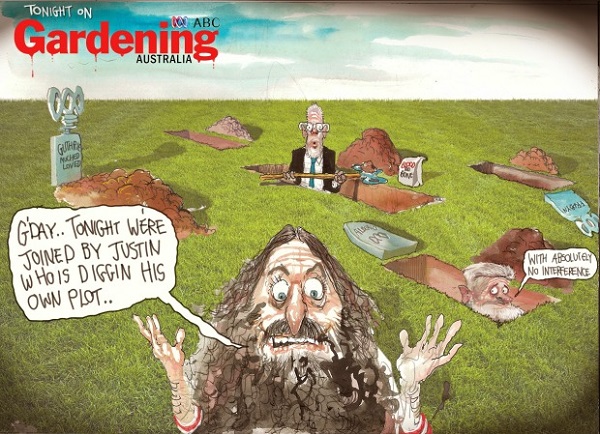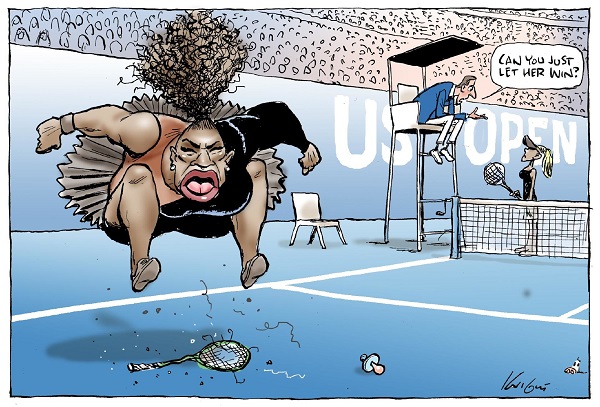Today’s offering:
1. Richard di Natale made a speech
2. Hayne blasts big banks
3. Facebook shuts Fraser Anning down
4. Brett Kavanaugh vs Christine Blasey Ford
Today’s offering:
1. Richard di Natale made a speech
2. Hayne blasts big banks
3. Facebook shuts Fraser Anning down
4. Brett Kavanaugh vs Christine Blasey Ford
Just when the most important thing going on in our fair land was preparation for football finals, our national broadcaster puts on a reality TV spectacular, except it is real. First the ABC’s board sacks the managing director Michelle Guthrie, now the chairman of the board Justin Milne sacks himself. Or more accurately dug his own grave as this David Rowe cartoon suggests:

That was from an article by Philip Coorey, who says the whole board, including the ABC staff representative should go. Continue reading ABC: chaos at the top with more to follow
Here’s Mark Knight’s Herald Sun cartoon which initiated a social media and general media storm around the globe:

My wife drew my attention to it in an article ‘Racist’ Australian cartoon of Serena Williams prompts global controversy in The New Daily.
Strangely, the cartoon is no longer there, and to save you trouble, none of those links lead to it. Continue reading Australian cartoon puts fuel on Serena fire
I’ll list here the contents of this edition. I haven’t worked out how to link down, perhaps next time.
Remember this is an open thread – you can raise any topic you like. Continue reading Weekly salon 23/9

Much has been written since the women’s final of the 2018 US Open Tennis Championships saw world number one Serena Williams beaten by a young rising star Naomi Osaka after receiving a code violation warning, then a point penalty and finally a game penalty, which put Osaka in an excellent place to win the second set 6-4 and the match. Elite opinion, especially overseas, has come down heavily in Williams’ favour, blaming the umpire Carlos Ramos for his handling of the incident, which, it is said, was an example of sexism because he would never have treated a male player so harshly, and probably racism to boot.
I’ll tell you my opinion, on the evidence I’ve seen (I didn’t watch the match) and comment on the commentary. My conclusion is that tennis needs to put its house in order, and has missed a golden opportunity to enforce rules so that tennis fans can expect to see excellent tennis being played, rather than players venting. Continue reading Serena meltdown a missed opportunity
I believe that by the middle of next decade people denying significant human agency in causing climate change will constitute a crank fringe and will basically be ignored.
The Climate of the Nation 2018 report, now produced by The Australia Institute (pdf here), found that more Australians accept the reality of climate change than at almost any time since Climate of the Nation began in 2007.
Acceptance of climate change closely follows voting intentions, but interestingly while One Nation (22%) and Nationals (15%) voters are the most likely to say they do not think that climate change is occurring, this declined significantly for both groups since 2017.
The effects of heat are the driving concern about the impact of climate change, and people were most concerned about more droughts and flooding affecting crop production and food supply (78%), destruction of the Great Barrier Reef (77%) and more bushfires (76%).
Brian’s internet has dropped out for the weekend.
We will just have to come up with things we think will be good to discuss for this Saturday Saloon without Brian’s contribution.
“One of the most concerning developments in politics is that the quality of an argument no longer matters,” he said.
He went on to say that they all knew we needed to head for zero emissions. They just wanted to know what the rules would be on the way.
That was from the AFR article Labor backs the NEG as political mess sends power prices up. The print edition carried it as a front page headline story:
One out of every six premature deaths in the world in 2015 — about 9 million — could be attributed to disease from toxic exposure, according to a major study released on Thursday in The Lancet medical journal.
The worst affected countries are in Asia and Africa, with India topping the list. Continue reading Weekly salon 9/9

Some time in the last few days I heard a person who should know better say that 1800 coal-fired power plants were being built around the world. One wonders where this (dis)information comes from. It went unchallenged by the ABC interviewer, showing once again that ABC journalists and presenters need an update on climate change – in the national interest.
As Adam Morton at The Guardian writes The world is going slow on coal, but misinformation is distorting the facts. Back in June, John “Wacka” Williams asked the Parliamentary Library how many coal plants there were, how many were being built, how many closed etc and could he have the information by 4pm?
The Library included the information that 621 units were being built, the point here being that power plants typically have multiple units. Hazelwood had eight.
Unfortunately, this information was wrong. Continue reading Coal power fading fast
The Liberal party has changed leader, in part because of climate change, and are now proceeding with pretty much the final policy landed upon by Malcolm Turnbull, with a couple of significant twists. We now have a very explicit instruction that energy prices along with keeping the lights on are the main game, while emissions reductions can be safely put off to the never-never.
The Coalition government under Scott Morrison is now almost completely isolated on energy and climate change. Compared to adult countries we look completely foolish, The question remains whether the main actors, the states and the corporates investing in the system, can move forward regardless. Continue reading Reconnecting climate change politics with reality
Dr Mal Washer was a Liberal member of the Australian House of Representatives from October 1998 to August 2013. While he was there it is said he was doctor to the house, providing medical help and personal counselling to members of parliament.
When Waleed Aly and Scot Stevens spoke to Katharine Murphy about whether the Dutton insurrection was a symptom of how we do politics in Australia, she quoted Washer inter alia. She gave a three-part answer.
First, the major parties once represented stability to the electorate. Not any more. Rather the reverse. What happened is now hard-baked into the system. Continue reading Weekly salon 2/9